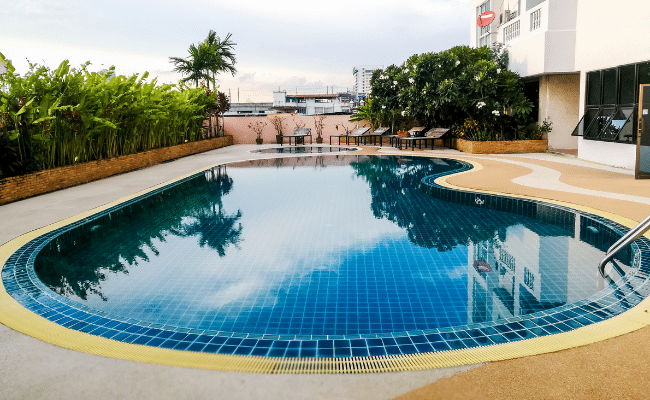
Table of Contents
Can you swim after eating?
Swim After Eating, Some people think it is a good idea to go swimming after eating as they believe the food will be forced out of the stomach by the increased pressure during exercise. However, this is not correct! In fact, vomiting while swimming is possible.
Swimming can be dangerous when you have eaten recently due to the strong risk of water entering your lungs. If any small amount of water goes into the lungs, it may cause an inflammation (known as ‘swimmer’s or ‘aquatic’ lung) that can take a long time to resolve and may even require hospital treatment.
The inflammatory response of swollen airways and fluid in the lungs increases breathing difficulties and causes coughing – symptoms similar to those produced by common respiratory infections such as colds and flu.
So, swimming soon after eating is not recommended, as water can easily go into your lungs and cause damage and inflammation which will lead to breathing difficulties and a very unpleasant experience!
It is best to wait for 2-3 hours before going in the pool or sea after eating an average size meal containing carbohydrates (bread, cereal), fat (butter, oil), or protein (meat, fish). However, it is advisable to wait 6 hours after consuming alcohol before diving in!
What happens when we swim after eating?
When it comes to the question of whether it is ok to swim after eating, most people would answer: Yes. Swimming is a healthy and enjoyable way of staying in shape.
Despite being a physical activity, swimming does not necessarily have to be tiring. But what about digestion? Is there a chance that it interferes with water sports? Let’s find out!
During our regular activities like going to school or work, taking public transport or performing household chores, we usually do not pay much attention to our digestive process.
After all, it works unseen and usually without letting us notice any problems. However, during sports activities, we tend to put extra on our body parts such as our legs, arms, or our stomach. And the digestive process is no exception.

It has been estimated that during a meal about 12 different parts of the body take part in absorbing nutrients from our foods and getting them ready for use in our cells.
This means that digestion requires really efficient cooperation between all these organs so they can fulfill their duty as soon as possible.
For example, when we eat, the food passes through the oesophagus to reach the stomach where – thanks to digestive juices such as gastric acid and enzymes – it finally gets broken down into smaller pieces of what are called molecules (that’s why we call them nutrients).
These nutrient particles are then absorbed by small structures called villi which line the intestinal walls (where most of the absorption takes place).
For this reason, a nice meal will generally give us enough energy for about 2-3 hours. After that time has passed, we usually start feeling hungry again because our cells have used up all of the nutrients and need more food in order to keep functioning properly.
So how does swimming affect digestion?
As mentioned above, digestion requires proper cooperation between many different body parts including the stomach as well as most of our muscles such as those belonging to the arms or legs.
And although it may seem surprising at first, even exercises like swimming can interfere with the digestive process! The reason why it is not advisable to swim after eating rests in one single word: water pressure.
SW means being submerged into the water so when we swim after eating, we are actually constantly under water pressure which in turn puts a lot of pressure on the stomach.
This means that during swimming, all of our blood flow is directed to the muscles which mean that most organs like the stomach get less blood than they would otherwise.
In other words, lack of blood supply makes digesting food very difficult and if it persists for too long, chances are you will experience digestive problems such as bloating or cramps.
Why wait to swim after eating?
Among competitive swimmers, the most common question I get asked is “How long should I wait to go swimming after eating?”
The answer varies depending on what type of meal was eaten and when it was eaten. Anywhere from a few minutes to two hours can be appropriate.
It really depends on the meal itself and how much food you have consumed. Generally speaking, however, you will want to avoid swimming immediately after a large meal that contains protein or fat due to their digestion time—which averages 3+ hours for both macronutrients.
As a result, you may feel bloated or cramp in your muscles while training if you swim too soon afterward.

Smaller meals or snacks containing carbohydrates (simple sugar) digest quickly and are the recommended pre-swim meal. A sports drink consumed simultaneously can also speed up digestion if you have a race within an hour or so.
A good rule of thumb for competitive swimmers is to wait about 30 minutes after eating before swimming.
Business lunches, on the other hand, rarely fall under this category as they typically contain a balance of both protein and carbohydrate in one sitting, making it easy to swim right away without feeling nauseated or bloated.
The key here is moderation—especially in tests such as eating sushi which has a fat content that may take longer to digest than normal.
In fact, female teammates who have regular monthly cycles often prefer to eat more fatty meals in preparation for their cycle because it helps them store more energy reserves. This leads to a noticeable improvement in performance during the few days leading up to menstruation.







